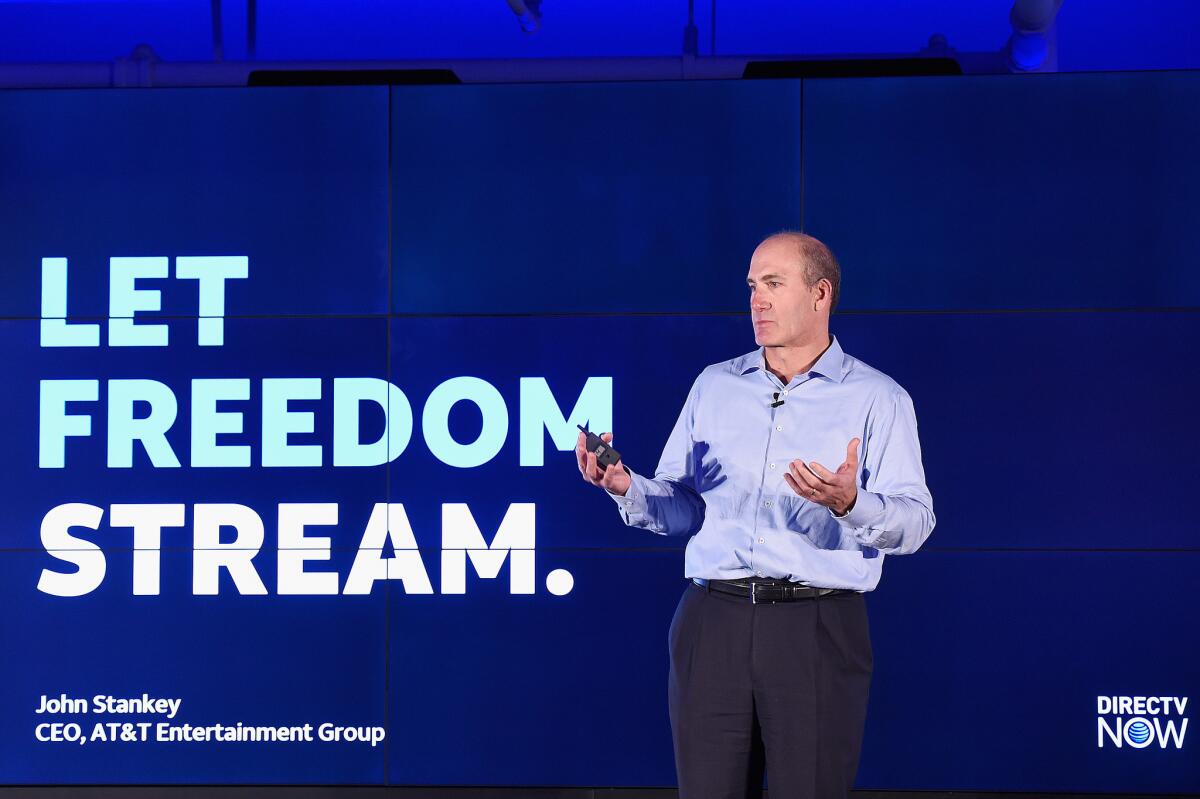AT&Tâs DirecTV Now streaming service is targeting cord-cutters and young adults

AT&T on Monday unveiled its streaming service, DirecTV Now, with hopes of enticing young adults and budget-conscious customers with a less expensive bundle of live television networks.
The DirecTV Now streaming service launches Wednesday with such premium brands as AMC, ESPN, Fox News, HGTV, NBC and Nickelodeon.
The service is designed to appeal to consumers who are part of the estimated 20 million households in the U.S. without a pay-TV subscription, and to those who watch entertainment mainly on mobile phones.
The TV channel bundles â available through an app, streaming device or Web browser â will be offered at four subscription price points, including a package of 60 channels for $35 a month and a 120-channel bundle for $70 a month.
Already the nationâs largest television provider with more than 25 million subscribers, AT&T is taking aim at a fast growing segment: consumers who have ditched their traditional pay-TV packages to save money or exercise more control over their viewing experience â and millions of younger consumers who never signed up.
Wall Street has been closely watching to see whether DirecTV Now will dramatically reshape the television business. Some analysts worry that AT&T might be offering premium TV channels at too steep of a discount, thereby encouraging more people to cut the cord.
After AT&T announced the basic package would cost $35 a month, prominent research firm MoffettNathanson issued a report with the headline: âRunning with Scissors.â
AT&T has been eager to gain a foothold in the streaming space before technology giants such as Google and Apple Inc. roll out their own subscription bundles of traditional TV channels. Dish Network launched its competing Sling TV streaming service more than a year ago, and Sony PlayStation has its own package called PlayStation Vue. Next year, online video service Hulu plans to offer its own bundles of TV channels.
AT&T has used its advantage as a market leader to leverage existing partnerships with traditional programmers, including Walt Disney Co. and 21st Century Fox. For more than a year, DirecTV executives have been hammering out new deals with those media companies for the rights to live stream their channels so that DirecTV could create a more robust service than its rivals.
One notable holdout is CBS Corp., which means CBS and Showtime channels wonât be part of DirecTV Now when it launches. CBS is holding out for higher fees. NFL games also wonât be available because another phone provider, Verizon, has those streaming rights.
DirecTV Now was designed to appeal to younger audiences. AT&T plans to include a channel featuring pop star Taylor Swift and another channel for women called âHello Sunshine,â backed by entertainment mogul Peter Chernin and actress Reese Witherspoon.
The service also is targeting people who move often. It does not require a contract, and customers who live in apartments or those with low credit scores can qualify, AT&T executives said. The service was also designed to be easy to use, particularly on a mobile phone.
âThis is the foundation in how we are going to do things in the future,â AT&T Entertainment Group Chief Executive John Stankey said during Mondayâs presentation, noting that 50% of the companyâs customers already watch video âon something other than a TV set hanging on a wall.â
Traditional media companies recognize that they must evolve to keep up with changing consumption patterns and rising competition. Over the last two years, an estimated 2 million subscribers have dropped their TV subscriptions, opting for online outlets such as Netflix, Hulu and Amazon Prime Instant Video.
AT&T also touted discounted add-ons. For example, the Dallas phone company is offering premium channel HBO to DirecTV Now subscribers for an additional $5 a month. That contrasts with the approximately $15 a month that HBO typically costs premium pay-TV subscribers.
AT&T also said DirecTV Now streaming would not count against data caps for its mobile phone users. Some consumer rights advocates worry that AT&T phone users could run up big data bills by streaming content from other providers such as Hulu or Netflix, giving DirecTV a competitive advantage.
More to Read
Inside the business of entertainment
The Wide Shot brings you news, analysis and insights on everything from streaming wars to production â and what it all means for the future.
You may occasionally receive promotional content from the Los Angeles Times.











